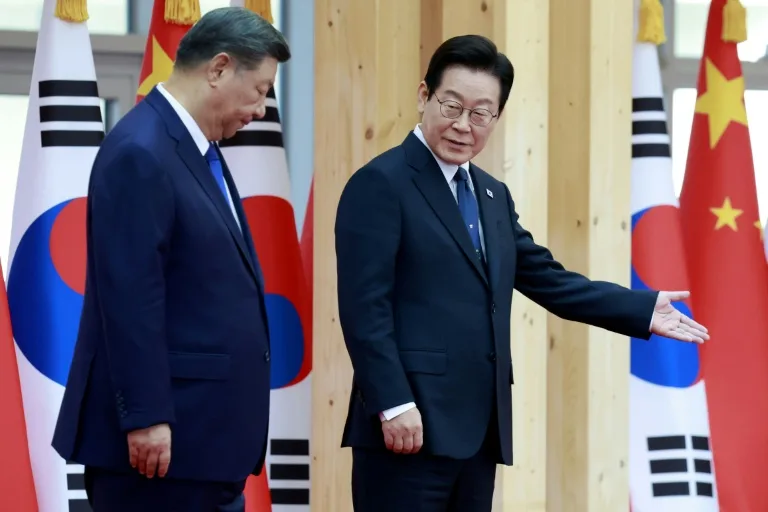
Chinese President Xi Jinping Meets South Korean Leader Lee Jae Myung in Landmark Visit
In a historic diplomatic move, Chinese President Xi Jinping arrived in South Korea on Saturday for the first time in more than a decade, meeting with newly elected South Korean President Lee Jae Myung on the sidelines of the Asia-Pacific Economic Cooperation (APEC) summit in Seoul. This highly anticipated meeting underscores shifting geopolitical dynamics in the region—especially in light of U.S. President Donald Trump’s early departure from the summit following a temporary truce in the U.S.-China trade war.
As leaders from the Asia-Pacific region gathered in Seoul, Xi’s presence became a central focus, signaling China’s intent to reclaim diplomatic influence and reset relations with several key nations, including South Korea and Canada.
A Reset in China–South Korea Relations
The Xi-Lee summit on Saturday marked a symbolic reset in bilateral relations that had been frayed by disputes over trade policies, cultural issues, and security concerns — including South Korea’s hosting of the THAAD missile defense system in 2017, which prompted strong objections from Beijing.
During their meeting, President Lee emphasized the need for a more equal and mutually beneficial partnership between the two nations. “As our two countries move from a vertical structure of economic cooperation to a more horizontal and mutually beneficial one, we must work together to build a relationship that delivers shared prosperity,” Lee said during the official welcome ceremony attended by South Korean officials and soldiers in traditional dress.
Xi echoed the sentiment, referring to South Korea and China as “important neighbors that cannot be moved, and partners that cannot be separated.” He called for deeper mutual respect and trust, acknowledging cultural and political differences while urging dialogue to overcome areas of disagreement.
Renewed Financial and Security Cooperation
In a key development, South Korea confirmed that the two nations renewed their massive 70 trillion won ($49 billion) currency swap agreement for another five years—a move aimed at stabilizing financial markets amid global volatility. The two countries also signed a series of Memorandums of Understanding (MOUs), highlighting shared goals such as combating online fraud and enhancing cyber security cooperation.
Additionally, Seoul and Beijing appeared to find common ground on North Korea. President Lee expressed hopes that China could serve as a stabilizing force amid stalled nuclear talks, referencing recent diplomatic exchanges between Beijing and Pyongyang. Xi reaffirmed China’s commitment to peace and stability on the Korean Peninsula.
Xi’s Diplomatic Outreach at APEC 2025
With U.S. President Donald Trump absent from the latter half of APEC, Xi Jinping used his time in Seoul to strengthen diplomatic ties with other regional leaders. He met with Canadian Prime Minister Mark Carney — the first official meeting between Canadian and Chinese leaders since 2017 — and called for a “reset” in the once-frosty bilateral relations.
Carney hailed the meeting as a “turning point” in Canada-China ties, despite lingering friction caused by U.S. trade policies and past disputes, including the Meng Wanzhou extradition case.
The Chinese leader also held talks with Japan’s newly elected Prime Minister Sanae Takaichi, known for her tough stance on China. Despite past tensions, Takaichi expressed interest in fostering a “strategic and mutually beneficial relationship” with Beijing.
Looking Ahead: China to Host APEC 2026
At the conclusion of the APEC summit, President Lee formally passed the leadership baton to Xi, who confirmed that China would host the 2026 APEC summit in Shenzhen. The announcement signals Beijing’s continued ambition to lead regional economic integration and diplomatic efforts in Asia.
As Xi Jinping’s South Korea visit wraps up, analysts say his string of bilateral meetings reflect a broader Chinese effort to reshape the geopolitical landscape — especially as the U.S. grapples with internal and international challenges.


Leave a Reply